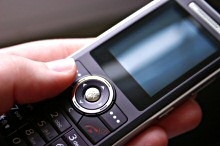Mobile phone software to link global research
 London, Oct 21 : New mobile phone software will help epidemiologists and ecologists analyse data remotely and map findings across the world, without going to the lab.
London, Oct 21 : New mobile phone software will help epidemiologists and ecologists analyse data remotely and map findings across the world, without going to the lab.
The study authors from Imperial College-London (ICL) say the software will also enable members of the public to act as 'citizen scientists' and help collect data for community projects.
The researchers have developed an application for 'smartphones' that allows a scientist to collect and record data, photos and videos - for example to document the presence of an animal or plant species - and then send this information to a central web-based database.
The website records the user's location, using the phone's GPS system, and it can then display all of the data collected on this topic across the world, using Google Maps.
Users can also use their smartphones to request and view all the maps and analyses available. The new technology, funded by the Welcome Trust, means researchers should be able to quickly build up and share maps of, for example, the distribution of an endangered species or cases of a disease, and analyse patterns that emerge.
The ICL team is currently using the software, known as EpiCollect, as a tool in their studies of the epidemiology of bacterial and fungal infectious diseases, says an ICL release.
David Aanensen, lead study author, from the department of Infectious Disease at ICL said: "We're excited about launching this new software - researchers have been able to send information by phone before, but this is the first time that we have been able to link all the functionality of smartphone technology to a web-based database for scientists to use."
"If a research team or a group of school children wants to look at how a particular species is spread across their locality, or the world, they can download the application for free and start collecting and submitting data to a project website," adds Aanensen.
These findings were published in PLoS ONE. (IANS)